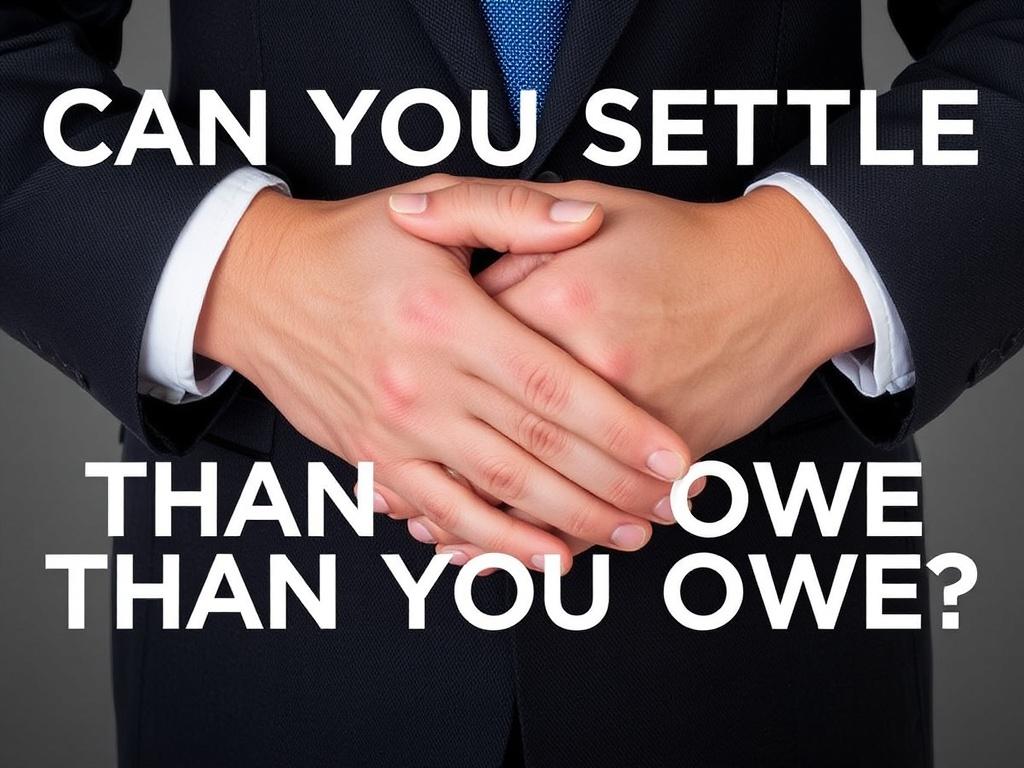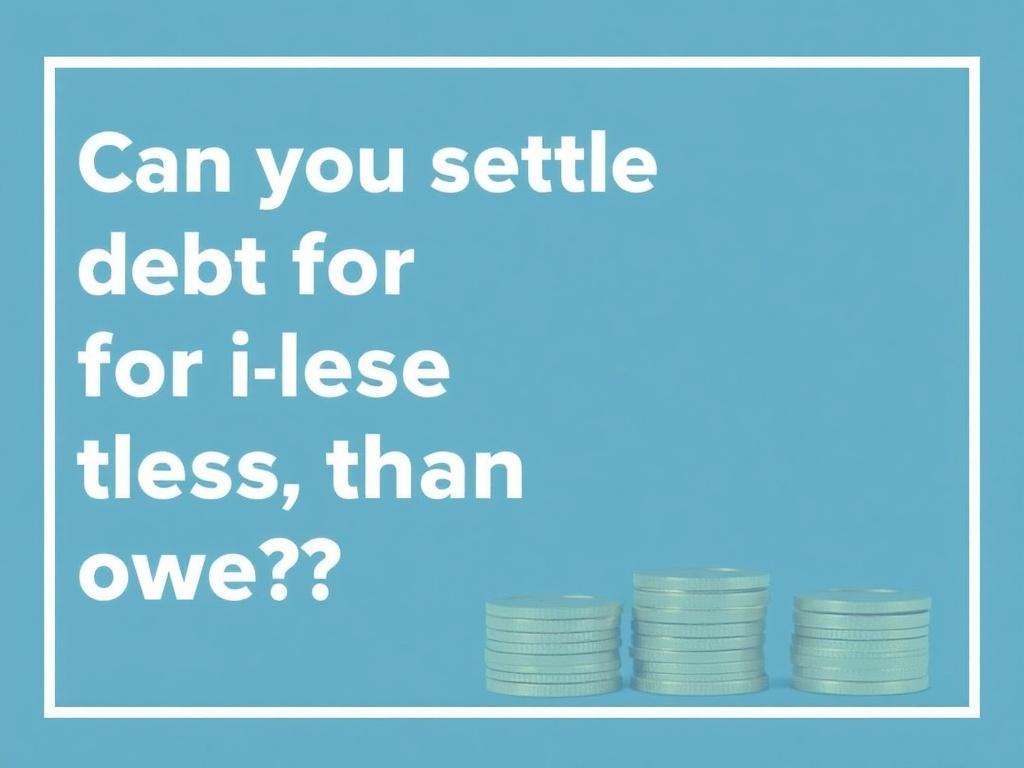SQLITE NOT INSTALLED
Содержание
Understanding Debt Settlement: What Does It Mean?
Debt can sometimes feel like a heavy cloud hanging over your head, making everyday life stressful and overwhelming. If you’ve ever wondered, “Can you settle debt for less than you owe?” you’re not alone. The simple answer is yes—under certain circumstances, creditors might accept less than the full balance owed in order to close your account. This process is known as debt settlement, and it can be a helpful strategy to regain control of your finances. But let’s dive deeper because the details matter, especially when it comes to your financial future.
How Does Debt Settlement Work?

Debt settlement is essentially a negotiation between you and your creditors where you offer to pay a lump sum that is less than the total amount owed. Creditors might accept this reduced amount because they would rather recover some money than risk getting none if you default or declare bankruptcy. It’s important to approach this option carefully and understand the steps involved:
- Assess Your Debt: List all your debts and determine which accounts might be eligible for settlement.
- Budget for a Lump Sum Payment: Debt settlement usually requires a lump sum payment, so having the funds available is crucial.
- Contact Your Creditor: You can negotiate directly with creditors or hire a debt settlement company to assist.
- Get Terms in Writing: If the creditor agrees to settle, ensure you get the details of the settlement in writing before making any payments.
Who Can Benefit From Debt Settlement?
Many people wonder, “Can you settle debt for less than you owe?” especially when debt feels unmanageable. Debt settlement might be a viable option if you’re struggling to make minimum payments and want to avoid bankruptcy. However, it often works best for unsecured debts like credit card balances, medical bills, or personal loans. Secured debts such as mortgages or car loans usually aren’t eligible for settlement because your collateral (your home or car) can be repossessed.
Pros and Cons of Settling Debt for Less
Before you jump into negotiating a debt settlement, it’s important to weigh the advantages and disadvantages of this approach. Here’s a helpful comparison table to guide your thinking:
| Pros | Cons |
|---|---|
| Can reduce your total debt by a significant amount. | Settling debt can negatively impact your credit score. |
| Helps you avoid bankruptcy. | Creditors may refuse to settle if you have good payment history. |
| Stops collection calls and legal actions once settled. | Settled debt may be considered taxable income by the IRS. |
| Offers a clear endpoint to your debt struggle. | Requires a lump sum payment, which might be a challenge to gather. |
Will Settling Debt Hurt Your Credit?
One of the biggest concerns people have is whether settled debt will damage their credit score. Unfortunately, the answer is usually yes. When a debt is settled for less than you owe, the creditor will typically report this to credit bureaus as “settled,” which is different from “paid in full.” This notation will stay on your credit report for up to seven years and can hinder your ability to get new credit during that period. However, the long-term impact varies based on your overall credit profile and whether you continue to manage your credit responsibly after settlement.
Common Types of Debt You Can Settle
If you’re wondering, “Can you settle debt for less than you owe?” it helps to know which debts are most commonly settled:
- Credit card debt: This is the most frequent target for debt settlement programs because these debts are unsecured and have high interest rates.
- Medical bills: Hospitals and medical providers may agree to settle outstanding medical debt, especially if you can demonstrate financial hardship.
- Personal loans: You might negotiate settlements on personal loans, though some lenders may be less flexible.
- Utility bills and service debts: Occasionally, utility companies will agree to a settlement, but it depends on their policies.
On the other hand, debts like student loans, taxes owed to the IRS, mortgages, and car loans are often not eligible for traditional debt settlement.
Steps to Successfully Settle Debt for Less Than You Owe
If debt settlement sounds like a potential solution for you, here’s a comprehensive list breaking down the essential steps to maximize your chances of success.
- Evaluate your financial situation: Know exactly how much debt you owe, your monthly income, and expenses to determine if settlement is feasible.
- Prioritize debts to settle: Focus on debts with the highest interest rates or debts in collections first.
- Save for a lump sum payment: Securing a lump sum to offer is vital since many creditors prefer upfront payment.
- Reach out to creditors or debt collectors: Discuss your financial hardship and propose a settlement amount.
- Negotiate the amount: Start with a lower offer, typically between 30% to 50% of your total balance.
- Get everything in writing: Never make payments without a written agreement confirming the settlement.
- Make your payment promptly: Pay the agreed lump sum according to the terms to conclude the settlement.
- Check your credit report afterward: Verify that the settlement is reported accurately.
Tips for Negotiating Debt Settlement
Negotiating can feel intimidating, but keep in mind that creditors often prefer settlements over the risk of receiving no payment. Here are some practical tips to negotiate effectively:
- Be honest about your financial hardship but avoid oversharing.
- Start with a lower offer to leave room for negotiation.
- Be prepared to explain why you can’t pay the full amount but can afford a lump sum.
- Stay calm and professional during all communications.
- Consider working with a reputable debt settlement company if negotiating yourself is stressful or overwhelming.
Debt Settlement Companies: Are They Worth It?
If you find the process of settling debt confusing or overwhelming, you might consider hiring a debt settlement company. These companies negotiate on your behalf and can often use their experience and relationships with creditors to get better deals. However, there are some important things to keep in mind before choosing this route:
| Advantages | Disadvantages |
|---|---|
| Experienced negotiators may reduce your debt faster. | Fees can be high, often a percentage of the amount saved or paid. |
| You won’t have to manage creditor communications yourself. | Some companies may make unrealistic promises. |
| Can provide structured payment plans. | Not all companies are legitimate; beware of scams. |
Before signing up with any debt settlement company, check reviews, verify their credentials, and understand all fees upfront.
Other Alternatives to Consider Before Debt Settlement
While debt settlement is one way to reduce the amount you owe, it’s not the only option. If you’re unsure whether settling your debt is the right path, consider these alternatives:
- Debt consolidation: Combining multiple debts into one loan with a lower interest rate can simplify payments and save money over time.
- Credit counseling: Nonprofit credit counseling agencies help you create a debt management plan that negotiates lower interest rates but requires full repayment.
- Bankruptcy: A last-resort option that legally eliminates most types of unsecured debt but has significant long-term credit consequences.
- Budgeting and financial planning: Sometimes, tightening your budget and increasing income over time can help you pay off debt without settlement.
When Should You Avoid Debt Settlement?
Certain situations may make debt settlement less favorable or even risky, including:
- If you have the money to pay off your debt in full or through a management plan.
- If settling debt will cause more harm than good to your credit or finances.
- If you’re dealing with secured debts or tax debt.
- If a debt settlement company pressures you for upfront fees.
Always carefully assess your financial situation, consider all options, and consult a financial advisor or credit counselor before making a decision.
Frequently Asked Questions About Settling Debt for Less Than You Owe
Is it legal to settle debt for less?
Yes. Debt settlement is a legal process and commonly practiced by many consumers and creditors.
How much can I expect to pay in a debt settlement?
Typically, settlements range from 30% to 70% of the total balance, but it varies based on the creditor and your situation.
Will my creditor accept a settlement offer right away?
Not always. Negotiation is common, and creditors often expect you to start with a lower offer.
Can I settle debt without a debt settlement company?
Absolutely! Many people negotiate directly with creditors, though it requires patience and diligence.
What happens if I don’t make the settlement payment?
Failing to pay agreed settlement terms may lead to debt collection, additional fees, or lawsuits.
Debt Settlement: Myths and Realities

There are many misconceptions about settling debt for less than you owe. Let’s clear a few up:
- Myth: Debt settlement will erase all your debt without any consequences.
Reality: Debt will be reduced, but credit scores usually take a hit and taxes may be owed on forgiven amounts. - Myth: Settling debt damages your credit forever.
Reality: The impact lasts several years but can be mitigated over time by good financial habits. - Myth: Debt settlement companies are unethical.
Reality: While some are scams, many reputable companies provide helpful services if chosen carefully.
How to Prepare for Debt Settlement
Preparation is key to successful debt settlement. Here’s a checklist to help you get ready:
| Step | Details |
|---|---|
| Understand your debts | Gather all statements, note balances, due dates, and interest rates. |
| Calculate what you can afford | Review your budget to see how much lump sum you can realistically offer. |
| Research creditors | Identify which creditors are more likely to settle. |
| Practice negotiation | Prepare what you’ll say to creditors or collect offers from settlement companies. |
| Get professional advice | Speak to a credit counselor or financial advisor, if needed. |
What Happens After Debt Settlement?
Once your debt is settled, you might think you’re done—but the journey doesn’t end there. Here are some common post-settlement experiences:
- Credit Report Updates: Your account will show as settled or paid, which looks different from “paid in full.”
- Possible Tax Bill: You may receive a 1099-C form showing forgiven debt as taxable income—consult a tax professional.
- Improving Your Credit: Begin building positive credit habits like paying bills on time and keeping credit utilization low.
- Learning Financial Skills: Use this fresh start to craft a realistic budget and stick to it.
Summary: Is Settling Debt for Less Than You Owe the Right Move?
Deciding whether to settle debt for less than you owe is a significant choice that depends on your unique financial situation. If your debt is overwhelming, and you have the ability to make a lump sum payment for less than what you owe, debt settlement might offer a way out. It’s a tool that comes with pros and cons, impacts your credit, and may have tax consequences. But if faced with relentless collection efforts or the threat of bankruptcy, a negotiated settlement could bring you peace of mind and financial relief. Always weigh your options, understand the terms clearly, and try to seek professional advice to ensure that settling debt supports your long-term financial health.
Conclusion

Yes, you can settle debt for less than you owe, and it can be a strategic way to resolve difficult financial situations. Whether you negotiate on your own or enlist professional help, being informed and prepared is key to success. Remember, settling debt is not a quick fix but a step toward rebuilding your financial future. Approach the process thoughtfully, strive for transparency with your creditors, and plan for the changes to your credit and taxes that may follow. With patience and smart decision-making, you can emerge from debt settlement with a brighter, more secure financial outlook.
Опубликовано: 23 July 2025 Кредитрон – блог о кредитах, финансах и прочих реверансах
Кредитрон – блог о кредитах, финансах и прочих реверансах

